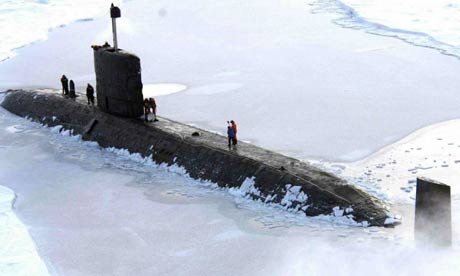'Unacceptable' errors led to deaths in fire aboard sub on Arctic patrol
- The Guardian,
- Friday June 13 2008
- Article history

HMS Tireless in polar conditions: the fire aboard the nuclear-powered submarine was caused when a unit providing extra oxygen exploded. Photograph: AFP
A fire that killed two sailors aboard a nuclear-powered submarine as it patrolled beneath the Arctic ice was caused by a catalogue of errors that could have been avoided, the Ministry of Defence admitted yesterday.
Paul McCann, 32, and Anthony Huntrod, 20, died when a unit used to provide extra oxygen exploded aboard HMS Tireless in March last year.
Yesterday, a board of inquiry report detailed failures in the "acquisition, manufacture, transport, storage, stowage and logistics management" of the units. The armed forces minister, Bob Ainsworth, apologised "unreservedly" to the men's families.
"These events are unacceptable and it is clear from the board of inquiry and other work to date that the MoD must accept responsibility for what happened," he told the Commons.
"It is right for me to apologise unreservedly on behalf of the department for the actions or omissions which contributed to this tragic incident. I am extremely sorry, particularly to the families of those who lost their lives or were injured."
The fire started when a Scog - self-contained oxygen generator - used to supply extra oxygen when a submarine is under thick ice exploded in Tireless's forward escape compartment. Leading Operator Mechanic McCann and Operator Mechanic Huntrod were killed in the blast, which also injured a third sailor. There had been many previous incidents of faults with the oxygen generators, the MoD report said.
Yesterday's report listed "systematic failings" that it said could have contributed to the accident.
These included:
· The MoD's failure to understand the potential dangers associated with the equipment despite previous problems;
· Almost 1,000 oxygen units that had been condemned as "hazardous waste" were upgraded to be safe to be used. It is not known whether the unit which exploded was one of these;
· Some of the units, which needed to be kept in secure dry storage, were left on a jetty for two weeks;
· There were "quality control" shortcomings at MPL, the manufacturers of the units.
A separate MoD investigation is trying to find out why these failings were allowed to continue and why the accident happened.
Last night Huntrod's parents accused the MoD of gross negligence.
"It is beyond belief that in this day and age our armed forces could be managed in a way that has such incredibly scant regard for the safety of those who enlist to serve their Queen and country," said Alan Huntrod and Brenda Gooch in a statement.
"We feel that if this was in any other walk of life, there would have been a prosecution for corporate manslaughter ... It is clear that there were no systems in place for the safe management of the devices. This would not be acceptable on an oil platform, a chemical plant or any other workplace and it should not be acceptable aboard a submarine.
"In our view the report sets out in clear detail overwhelming evidence of gross negligence making the Ministry of Defence culpable for the death of our son Anthony and Paul, his colleague."
Yesterday's report also criticised the way the next of kin were informed. It said the "defence community" and parts of the media heard about the deaths before the sailors' families, adding that some records held by the Navy were incorrect.
The board of inquiry investigation found the explosion was probably caused by oil that had seeped into the oxygen generator.
It stated: "Despite the presence of warnings about the explosive risk presented by contamination with organic materials, there was no real experience or understanding within the MoD of just how violently a contaminated sodium chlorate candle [oxygen generator] could react."
At the time of the accident HMS Tireless had been taking part in an Anglo-American operation beneath the Arctic ice. After the fire the submarine was forced to surface through an area of thin ice. The injured sailor was airlifted by the Alaska National Guard to an airforce base in Anchorage.
When the submarine returned to its home port of Devonport in Plymouth, Cmdr Iain Breckenridge praised his crews and singled out the injured man.
"If it had not been for [his] outstanding efforts ... the consequences of this incident may have been much worse," the report said. "The small fires caused by the explosion could easily have taken hold and a major conflagration ensued, with very serious consequences, if [name withheld] had not had the stamina and presence of mind to use all available means to extinguish them."
The MoD said that since the accident measures had been put in place to improve safety, and it was launching its own inquiry to discover what had caused the explosion.
"We are already rolling out new oxygen generators, with improved packaging and instructions," said a spokesman. "These changes will be reinforced in the near future with improved training in use of oxygen generators and understanding of potential dangers."